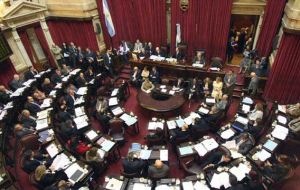MercoPress. South Atlantic News Agency
Kirchner wins: mid term elections advanced to June 28

Argentina’s ruling couple succeed in obtaining the necessary majority in Senate to advance mid term elections from October to June, arguing that in the current global downturn the government needs to focus on fighting economic problems and less on politics.
The proposal to hold the elections next June 28th (from October 25) was supported by 42 Senators, five more than the absolute majority (37) needed to change electoral legislation. Those opposing the bill mustered 26 votes.
Next June 28 therefore Argentine voters will elect half the 256-member chamber of deputies and a third of the 72-member Senate.
The elections are a key test for President Cristina Fernandez de Kirchner, who has seen her popularity fall steeply since she succeeded her husband, Nestor Kirchner, to the presidency in December 2007.
“It would practically be suicide to involve Argentines from now until October in a permanent discussion of political positions while the world is falling to pieces” said Mrs. Kirchner in a televised address when she first announced the proposal. Instead of campaigning, government resources should be directed toward “sustaining economic activity and the level of employment”.
The 42 aye votes included the Kirchners’ grouping (Victory Front) plus two Senators from Tierra del Fuego and one from Neuquen. The 26 nay were made up of the opposition Radicals, dissident members from the ruling coalition and independents.
The head of the government’s grouping Senator Miguel Angel Picheto said “there’s a highly irritable atmosphere in Argentina” and his peer from Santa Cruz and chairman of the Constitution Affairs Committee Nicolas Fernandez argued that advancing the elections was justified to avoid the “electoral rally” which would distract attention from the international crisis.
He accused the opposition of being “blind” and said it was good to start addressing issues from a collective convenience point of view and not from an electoral convenience stance.
Opposition Senator Freddy Martinez pointed out that other countries which are suffering the impact of the world crisis “have not advanced elections” and insisted it was a time “of consensus, not of divisions”.
Samuel Cabanchik who voted against the initiative argued that advancing the elections is “part of the problem not the solution”.
According to Argentine legislation elections must be held on the fourth Sunday of October. The bill approved was described as “an only time” exception.
The administration of Cristina Fernandez de Kirchner now has to make the necessary arrangements to convene elections with 90 days anticipation. With the new calendar campaigning is scheduled to begin next April 29.
Although most of the leading 2011 presidential hopefuls, some of dissidents from the ruling coalition, were against advancing elections, they have been unable so far to consolidate a unified opposition front.
Besides the Kirchner administration carrot-stick approach promising additional “co-participation” resources (from levies on farm exports) to revenue-starved provincial governments helped garner the absolute majority needed in the Senate.




Top Comments
Disclaimer & comment rulesCommenting for this story is now closed.
If you have a Facebook account, become a fan and comment on our Facebook Page!